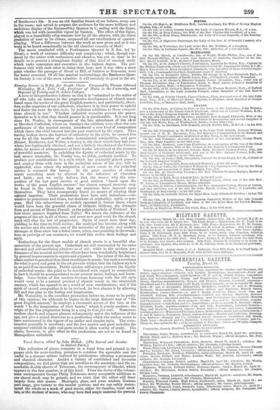Evening Service in B flat, for Double Choir. Composed by
Thomas Attwood Walrnisley, M.A. '1'rin. Coll., Professor of Music in the University, and Organist of Trinity and St. John's Colleges. A note to this production informs us that it is "submitted to the notice of all who take an interest in the progressive development of church music based upon the works of the great English masters; and particularly, there- fore, to the organists of our cathedrals, who have it in their power to uphold and foster the taste for this style, by judicious additions to those composi- tions already in use." Whether cathedral organists possess the power, desirable as it is that they should possess it, is questionable. It is not long since Dr. Wesley, in consequence of the late attendance of the choir at Hereford Cathedral, where on Sundays the children were often the sole performers of the musical service, introduced a new kind of composition which threw the chief interest into the part sustained by the organ. Thus having broken down the barriers of orthodoxy in the style, he opened free way for all the beauties of modern instrumental composition, and gave Mozart, Beethoven, and Weber, a footing in the choir which they had else- where less legitimately obtained, and not a little in the choirs of the Univer- sities, by means of arrangements of their works introduced at the instance of powerful amateurs. In upholding the dignity of cathedral music by the best means attainable, Dr. Wesley was, we think, perfectly justified. To produce new combinations in a style which has gradually gained ground, and employ them with taste in the cathedral music of the day, will be applauded, even where the adaptation of mass music to the cathedral service is esteemed flat heresy. In the great question of church musks something must be allowed to the influence of education and habit ; and we verily believe, that the reason why the com- position of the last good service or good anthem "based upon the works of the great English masters" has almost escaped memory, may be found in the restrictions that our musicians have imposed upon themselves. They have consequently found no means of obeying their natural impulses. Their productions have been cold imitations—sub- niiFsive to precedents and forms, but destitute of originality, spirit, or pur- pose. Had this subservience to models operated in former times, where would have been the graceful closes of Orlando Gibbons, the dramatic form and accent of Henry Purcell, or the polished melody of Weldon? Yet how these masters departed from Tallis! We detect the influence of the progress of the art in all of them; and every new good work for the church must still obey the law of progression. Styles of music have their day, yielding in due time to fresh modes: the madrigal has become, along with the service and the anthem, one of the memories of the past; and modern attempts at them show but a faded lustre, when, masquerading in the trunk- hose or periwigs of our ancestors, we would fain revive their feelings and style.
Enthusiasm for the finest models of church music is a beautiful cha- racteristic of the present age. Cathedrals are still surrounded by the same devoted and self-sacrificing admirers as of old ; while in the modern per- formance of the musical service the effects have been wonderfully heightened by general improvements in organs and organists. The talent of the day in- clines rather to practical than ideal excellence in music; • but such a reverence for what is good and great in the art prevails withal, that the highest style is in no peril from innovation. Public opinion will always preserve the dignity of cathedral music: the point to be considered with regard to composition is, how it should be accommodated to our present tastes, feelings, and know- ledge. Some fusion of the modern German harmony with the old style would seem to be a natural product of church music in the nineteenth century, which has opened to us a world of new combinations; and if the spirit of sacred composition is to be revived, its best chance is by allowing full and free play to the feeling and imagination. Mr. Walmisley, in the excellent production before us seems to be partly
of this opinion; for although he begins in the large us, way of "the great English masters," he employs a chromatic ascent of the bass at the words "In the imagination of their hearts," which is purely modern; the origin of the fine progression being in a song in Cosi fan- tutti. Numerous modern chords and elegant phrases subsequently attest the influence of the age, and give a mixed character to a production which the author seems to have commenced in the vigour of an earlier and simpler style. The coun- terpoint generally is excellent; and the free motion and goad melodies the composer exhibits in eight real parts render it often worthy of study. The choirs, however, to give effect to this production, are not to be found in Metropolitan cathedrals


























 Previous page
Previous page